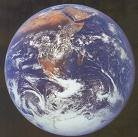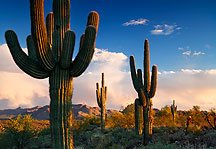I just came back from Leonardo DiCaprio’s new envirodoc, The 11th Hour. …and I’m not crying in my scotch, nor feeling suicidal, nor beyond depressed; mainly because it’s not telling me anything new but reinforcing information I already have upstairs. It shows that information in a different, broader light, basically expanding on An Inconvenient Truth, Gore’s envirodoc from last year. Thankfully, it's much less scientific and less of a brainiac exercise. I didn’t feel like I was sitting in an introductory version of “Global Warming for Dummies,” having to take careful notes like I did with the prior doc—the mere reinforcement of information was good enough and a nice approach.
Leonardo DiCaprio’s new envirodoc, The 11th Hour. …and I’m not crying in my scotch, nor feeling suicidal, nor beyond depressed; mainly because it’s not telling me anything new but reinforcing information I already have upstairs. It shows that information in a different, broader light, basically expanding on An Inconvenient Truth, Gore’s envirodoc from last year. Thankfully, it's much less scientific and less of a brainiac exercise. I didn’t feel like I was sitting in an introductory version of “Global Warming for Dummies,” having to take careful notes like I did with the prior doc—the mere reinforcement of information was good enough and a nice approach.
Instead of focusing on the finer scientific details, The 11th Hour assumes the accuracy of the data presented in Truth and pans the camera back even further to take a broader, almost spiritual angle on what is happening to the planet and the consequences for human habits and thinking of the 20th Century. In many ways it’s the fraternal twin to its predecessor.
Like Truth, is takes the audience through the consequences of a bleak future, interviewing the scientific community. It seems to wallow a bit in the darkness until it finally makes the upward climb and begins to present solutions to the current global climate crisis. It focuses on solutions involving outside-the-box thinking with renewable resources, green design (thinking of a building as sustainable like a tree, rather than existing as merely as a roof and bastion of energy consumption), and rethinking industrial waste and how such byproducts can be altered or refurbished to make it another entity's fuel (or food, in the case of fungi and mushrooms). Then of course there's the inevitable reality of having to overturn “big spoil” (a term I believe I came up with) and the political mechanizations that are working against such a transformation to a greener society living off cleaner energy methods.
scientific community. It seems to wallow a bit in the darkness until it finally makes the upward climb and begins to present solutions to the current global climate crisis. It focuses on solutions involving outside-the-box thinking with renewable resources, green design (thinking of a building as sustainable like a tree, rather than existing as merely as a roof and bastion of energy consumption), and rethinking industrial waste and how such byproducts can be altered or refurbished to make it another entity's fuel (or food, in the case of fungi and mushrooms). Then of course there's the inevitable reality of having to overturn “big spoil” (a term I believe I came up with) and the political mechanizations that are working against such a transformation to a greener society living off cleaner energy methods.
It goes into how we can learn from the structure of nature in order to ensure our own survival as a species. As I indicate in my comment in my margin about the polar bear, this film pointed out what is all to obvious to anyone who is in tune with environmental realities: that EVERYTHING on this planet is connected, and when we destroy the environment, we are destroying ourselves. WE ARE the environment.
The industrial revolution taught us differently and exists as an obsolete ideology that lives in a fantasy world; the notion that natural resources are abundant and that we can go on producing and expanding without any consequences for the planet. That ideology is archaic and narrow in its thinking, much like a child brought up in an abusive household. A lifetime (or generation, figuratively) of rehabilitation is necessary to amend the problem—and more realistically, it will involve a new generation to rethink how humans interact with their environment and built society around them, more than likely having to tear down and rebuild the 20th Century society as we knew it.
It’s merely a shift in thinking that needs to occur, and it doesn’t mean we need to erode our lifestyles as we know them. It’s an adjustment in thinking and approach. Rather than thinking of a built world vs. nature, think of everything as THE environment—YOUR ENVIRONMENT.
Make everyday decisions that embrace sustainability, and think one step beyond to expand your own life choices. When you consider transportation choices that embrace efficiency and promote health, why not also seek out telecommuting options—or when presented with the choice, go with the employer who will provide them? Be a taskmaster when driving around town and be efficient with your driving to reduce oil consumption—or why not try taking the bus? Turn the shower off while you lather up—why do you need the water on during that part of bathing anyway? Seriously, why? If it’s because it’s inconvenient to turn off the water, then you have bigger issues than what I’m trying to get at here.
expand your own life choices. When you consider transportation choices that embrace efficiency and promote health, why not also seek out telecommuting options—or when presented with the choice, go with the employer who will provide them? Be a taskmaster when driving around town and be efficient with your driving to reduce oil consumption—or why not try taking the bus? Turn the shower off while you lather up—why do you need the water on during that part of bathing anyway? Seriously, why? If it’s because it’s inconvenient to turn off the water, then you have bigger issues than what I’m trying to get at here.
What other examples can I think of… Don’t just purchase local produce, plant your own garden for that matter and grow your own produce, feeding it with food waste to produce mulch and carbonize the soil. Take a step back in your life and ask yourself if you need all that material “stuff” around you, and you might find that you won’t need ALL of it—and therefore won’t need to work and travel as hard to attain it. I know that sounds “countereconomic” at first, but think about it for a minute. Slowing down a bit and being frugal about your consumption does not mean a sacrifice in lifestyle… and according to The 11th Hour, if we don’t start changing our habits about how we live—and changing them quickly—we’ll have bigger issues to contend with than worrying about our dainty little lifestyles and the apathetic entitlement issues that tag along with them.
So that’s enough pontificating from me today. Go see the movie for yourself to enhance your understanding on what you should do be a better member of a democratic consumer-based society (remember what Obama says: "Make yourself useful!"), or check out the website if you can't make it to the theater. You might have to seek it out a bit, like in your progressive moviehouses in your “liberal” part of town, but it’s worth it. Hey, I even picked up several postcards and a free movie poster, suitable for framing… with a frame made from sustainable materials, that is… see? I’m faced with a choice right there as a direct result of seeing the movie… but will I take the bus to the framing store?
Hmmmm... facing another lifestyle choice, am I? ...or merely a choice involving frugality? S
















No comments:
Post a Comment